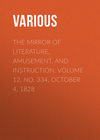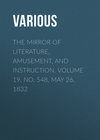Читать книгу: «The Mirror of Literature, Amusement, and Instruction. Volume 12, No. 334, October 4, 1828», страница 6
SPIRIT OF THE PUBLIC JOURNALS
TEA
The principal article of our commerce with China, namely, tea, is, perhaps, more singular in its history than any other article of commerce in the known world. A simple and unsophisticated shrub, in little more than half a century, has become an article of such general consumption, that it seems to form one of the prime articles of existence among the great bulk of mankind. It is the peculiar growth of a country, of which it forms almost the only link of connexion with the rest of the world. It forms the source of the largest commercial revenue to the British Government of any other commodity whatever, and of the largest commercial profits to the individuals concerned in its importation. Withal, it is the simplest, the most harmless thing that ever was offered to the gratification of man,—having, it is believed and argued by many, a moral influence wherever it is diffused. It is the rallying point of our earliest associations; it has ever given an additional charm to our firesides; and tends, perhaps, more than any one thing, to confirm the pre-existing domestic habits of the British public. Its exhilarating qualities are eagerly sought after as a restorative and solace from the effects of fatigue or dissipation; the healthy and the sick, the young and the old, all equally resort to the use of it, as yielding all the salutary influence of strong liquors, without their baneful and pernicious effects. Yet this shrub, so simple and so useful, is delivered to the community of this country, so surcharged with duties and profits beyond its original cost, that, did it contain all the mischievous qualities that are opposed to its real virtues, it could not be more strictly guarded from general use.
For the whole of our imports, including factory expenses and commission, the original cost in China amounts to the sum of two millions sterling. This is wonderfully increased before the British public can have any access to the article of consumption; thus:—

Oriental Herald.
DEATH OF YOUNG PARK
It is quite inconceivable with what increased zeal new candidates for African discovery come forward the moment that the death of any fresh victim to this pestilential country is announced. To the list of those who have already fallen, may be added young Park, the son of the late enterprising Mungo Park, and a midshipman of his majesty's ship Sybille. He went out in this ship with a full determination to proceed on foot, and alone, from the coast to the spot where his father perished, in the hope of hearing some authentic and more detailed account of the catastrophe than had yet been received. With leave of the commodore, he set out from Accra, and proceeded as far as Yansong, the chief town of Acquimbo, distant from the coast about one hundred and forty miles. Here the natives were celebrating the Yam feast, a sort of religious ceremony, to witness which Park got up into a Fetish tree, which is regarded by the natives with fear and dread. Here he remained a great part of the day, exposed to the sun, and was observed to drink a great quantity of palm wine. In dropping down from one of the lower branches, he fell on the ground, and said, that he felt a severe shock in his head. He was that evening seized with a fever, and died in three days, on the 31st October, 1827. As soon as the king, Akitto, heard of his death, he ordered all his baggage to be brought to his house, and instantly despatched a messenger to Accra, first making him swear "by the head of his father," that he would not sleep till he had delivered the message; it was to inform the resident of the event, and that all the property of the deceased would be forthwith sent down to Accra. This was accordingly done, and it did not appear on examination, that a single article was missing; even an old hat, without a crown, was not omitted. There was an idle report of Park being poisoned, for which there appears not the slightest foundation.—Q. Rev.
DIRGE
TO THE MEMORY OF MISS ELLEN GEE, OF KEW,
Who died in consequence of being stung in the eye
Peerless, yet hapless maid of Q!
Accomplish'd LN G!
Never again shall I and U
Together sip our T.
For, ah! the Fates, I know not Y,
Sent midst the flowers a B,
Which ven'mous stung her in the I,
So that she could not C.
LN exclaim'd, "Vile, spiteful B!
If ever I catch U
On jess'mine, rosebud, or sweet P,
I'll change your stinging Q.
"I'll send you, like a lamb or U,
Across the Atlantic C,
From our delightful village Q,
To distant OYE.
"A stream runs from my wounded I,
Salt as the briny C,
As rapid as the X or Y,
The OIO, or D.
"Then fare thee ill, insensate B!
Who stung, nor yet knew Y;
Since not for wealthy Durham's C
Would I have lost my I."
They bear with tears fair LN G
In funeral RA,
A clay-cold corse now doom'd to B,
Whilst I mourn her DK.
Ye nymphs of Q, then shun each B,
List to the reason Y!
For should a B C U at T,
He'll surely sting your I.
Now in a grave, L deep in Q,
She's cold as cold can B;
Whilst robins sing upon A U,
Her dirge and LEG.
New Monthly Magazine.
LINES SENT WITH A GOOSE
"When this you see,
Remember me,"
Was long a phrase in use,
And so I send
To you, dear friend,
My proxy. "What?" A goose!
THE GATHERER
A snapper up of unconsidered trifles.
SHAKSPEARE
CORPORATION LEARNING
At a late meeting of a certain corporation in Dorsetshire, for the nomination of a person to fill the office of Mayor, a sufficient number of the burgesses not being in attendance, it was intimated that an application would be made for a Mandamus, when one of "the worthy electors," being un-"learned in the law," innocently remarked, "I hope he will come, and then he'll put un all right and make un elect one."
Sept. 25, 1828.
This is not a Joe Miller joke, but one of actual and recent occurrence; although there is a similar story fathered on a sapient civic authority.
SELLING A WOMAN
The value that was set upon the bond-servants in the West Indies, is curiously exemplified in the following anecdote:—
There was a planter in Barbadoes that came to his neighbour, and said to him, "Neighbour, I hear you have lately brought good store of servants out of the last ship that came from England; and I hear withal that you want provisions. I have great want of a woman servant, and would be glad to make an exchange. If you will let me have some of your woman's flesh, you shall have some of my hog's flesh." So the price was set, a groat a-pound for the hog's flesh, and sixpence for the woman's. The scales were set up, and the planter had a maid that was extremely fat, lazy, and good for nothing; her name was Honour. The man brought a great fat sow, and put it in one scale, and Honour was put in the other. But when he saw how much the maid outweighed his sow, he broke off the bargain and would not go on.
SMOKING
Such is the passion for smoking at Hamburgh, that children about ten years of age may be seen with pipes in their mouths, whiffing with great gravity and composure.
PUBLIC ROADS
The turnpike-roads of England are above twenty thousand miles in length, and upwards of a million sterling is annually expended in their repair and maintenance.
John Bulwer, M.D. was author of many books, the most curious of which were his "Anthropo Metamorphoses," and "Pathomyotomia." We might conclude he was of Irish extraction; St. Patrick, the old song says, "ne'er shut his eyes to complaints," and Bulwer in his "Instructions to the Deaf and Dumb," tells us they are intended "to bring those who are so born to hear the sound of words with their eyes!"—Wadd's Memoirs.
CRANIOLOGY
Philosophy is a very pleasant thing, and has various uses; one is, that it makes us laugh; and certainly there are no speculations in philosophy, that excite the risible faculties, more than some of the serious stories related by fanciful philosophers.—One man cannot think with the left side of his head; another, with the sanity of the right side judges the insanity of the left side of his head. Zimmerman, a very grave man, used to draw conclusions as to a man's temperament, from his nose!—not from the size or form of it, but the peculiar sensibility of the organ; while some have thought, that the temperature of the atmosphere might be accurately ascertained by the state of its tip! and Cardan considered acuteness of the organ a sure proof of genius!—Ibid.
WILSON THE PAINTER
The late Mr. Christie, the auctioneer, while selling a collection of pictures, having arrived at a chef-d'oeuvre of Wilson's, was expatiating with his usual eloquence on its merits, quite unaware that Wilson himself had just before entered the room. "This gentlemen, is one of Mr. Wilson's Italian pictures; he cannot paint anything like it now." "That's a lie!" exclaimed the irritated artist, to Mr. Christie's no small discomposure, and to the great amusement of the company; "he can paint infinitely better."
SCOTCH DEGREE
A few years since, a vain old country surgeon obtained a diploma to practice, and called on Dr. H–, of Bath, with the important intelligence. At dinner, the doctor asked his new brother, if the form of diplomas ran now in the same style as at the early commencement of those honours? "Pray Sir, what might that form be?" says the surgeon, "I'll give it to you," replied our Galen, when stepping to his daughter's harpsichord, he sung the following prophecy of the Witches to Macbeth:
He must, he must,
He shall, he shall
Spill much more blood
And become worse,
To make his title good.
"That, sir, was the true ancient mode of conferring a Scotch degree on Dr. Macbeth."
G.J.Y
THREE FACES
Three faces wears the doctor; when first sought
An angel's—and a god's the cure half wrought;
But when, that cure complete, he seeks his fee,
The devil looks then less terrible than he.
This epigram is illustrated by the following conversation, which passed between Bouvart and a French marquis, whom he had attended during a long and severe indisposition. As he entered the chamber on a certain occasion, he was thus addressed by his patient: "Good day to you, Mr. Bouvart; I feel quite in spirits, and think my fever has left me."—"I am sure of it, " replied the doctor; "the very first expression you used convinces me of it."—"Pray explain yourself."—"Nothing more easy; in the first days of your illness, when your life was in danger, I was your dearest friend; as you began to get better, I was your good Bouvart; and now I am Mr. Bouvart; depend upon it you are quite recovered."
LYING
A Dutch ambassador, entertaining the king of Siam with an account of Holland, after which his majesty was very inquisitive, amongst other things told him, that water in his country would sometimes get so hard, that men walked upon it; and that it would bear an elephant with the utmost ease. To which the king replied, "Hitherto I have believed the strange things you have told me, because I looked upon you as a sober, fair man; but now I am sure you lie."
Покупайте книги и получайте бонусы в Литрес, Читай-городе и Буквоеде.
Участвовать в бонусной программе




















